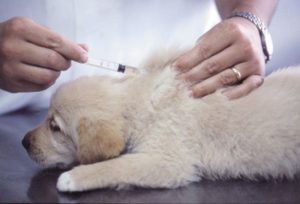 Vaccination Schedule for Canines
Vaccination Schedule for CaninesAll dogs should be vaccinated for Distemper/Parvo virus, Leptospirosis, Bordetella, Rabies, as well as Dewormed for parasites. Leptospirosis is now considered a “Core” vaccine as it has been reported in 36 states, including Arizona. It is spread in the urine of infected animals, including rodents, wildlife, pets, and livestock. People and dogs can be infected through contact with infected urine or urine-contaminated water or wet soil. Dogs with leptospirosis can potentially spread the infection to people. Dogs with leptospirosis can shed the bacteria in their urine for several months, even if they don’t have symptoms.
A pet’s vaccinations can begin at 6 weeks of age or older. Ultimately, these vaccinations are given yearly, except Rabies which is given every 3 years after one year of age. An older dog that is overdue for its yearly shots should always get a booster in three weeks, and then back to the yearly program. Puppies less than 10 weeks of age are vaccinated, and then booster in 3-to-4-week intervals until they are over 16 weeks old, then once yearly.
| 6 – 9 weeks | DAPPv + Round/Hook Deworming (+ Intestinal Parasite Screening upon request) |
| 10 – 12 weeks | DAPPv + Leptospirosis + Bordetella + Round/Hook Deworming |
| 13 – 16 weeks | DAPPv + Leptospirosis + Round/Hook Deworming + Rabies |
| 16 weeks (or older) | DAPPv + Leptospirosis + Round/Hook Deworming + Rabies |
| *First time 16 weeks and older | DAPPv + Leptospirosis + Round/Hook Deworming + Bordetella + Rabies |
Add Microchipping with free lifetime registration or Internal Parasite Screening today!
TLC has recently changed its protocols for vaccination. Leptospirosis is now part of our puppy and adult dog core vaccines. Leptospirosis is a zoonotic disease, meaning humans can pick up the bacteria from contact with urine of an infected dog. Dogs become infected through contact with infected urine or with water contaminated with infected urine from wildlife. When symptoms do occur, they include fever, muscle pain, vomiting and diarrhea, loss of appetite, lethargy, depression, and blood in urine. Lepto can remain in the soil for up to six months and is mostly found in grass and soil areas of parks and any place that urine from animals can be found. If you have any questions about this disease or vaccinating to help prevent it, please inform the veterinarian on staff.
Ask about getting the Rattlesnake Vaccine on dogs 16 weeks of age and older. If you live in a high-risk area where the western diamondback rattlesnake lives, and a snakebite is a significant risk, or where emergency treatment may be substantially delayed- Then this vaccine may be necessary for your dog. The Rattlesnake vaccine may reduce the severity of a dog’s reaction to a snakebite and could buy precious time for your dog before emergency care can be obtained.
For an animals’ first-time vaccinations at 16 weeks and older, vaccines may be required to be split up at veterinarian’s discretion for the safety of your animals’ health. Most vaccines will be required to have a booster in 3 – 4 weeks.
Since roughly 90% of all puppies and kittens are born with roundworms/hook worms they received from their mother, and can be transmitted to humans, we automatically de-worm them instead of doing a fecal exam. All a negative fecal test indicates is that there was no evidence of worms seen at the time of sample examine